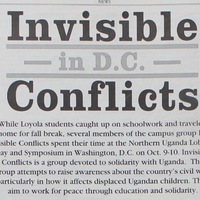Loyola Phoenix: Invisible Conflicts in D.C.
Item
Title
Loyola Phoenix: Invisible Conflicts in D.C.
Description
The title and first paragraph of a large article by William Barrett reports on the Loyola student organization Invisible Conflicts. Invisible Conflicts "is a group devoted to solidarity with Uganda. The group attempts to raise awareness about the country's civil war, particularly how it affects displaced Ugandan children. They aim to work for peace through education and solidarity." Members of the group went to the Northern Uganda Lobby Day and Symposium in Washington D.C. on October 9-10, 2006.
These students payed from their own pockets to travel to George Washington University to prepare for lobbying Congressmen "to craft a resolution for the two million people victimized by the two-decade long struggle in eastern Africa." The U.S. had not taken an official position on peace talks. Invisible Conflicts also felt it was important to hold leaders of African countries accountable for financial assistance being sent to them.
Many other organizations took part in the lobbying day. The students interviewed felt optimistic about the reception they received and felt that representatives such as Jan Schakowsky were ready to listen. They also listened to speakers and felt they gained a sense of the wide range of perspectives within the United States. Students stayed in youth hostels with other young lobby participants.
Invisible Conflicts planned screenings of the documentary "Invisible Children" at Galvin Auditorium in the Sullivan Center. They also planned to participate in the Gulu Walk at Wrigley Field on Oct. 21, 2006, an event "to highlight the plight of Acholi children in northern Uganda who trek each night to town centers for fear of being abducted and killed by the rebel army.
'The walk is a chance to tell the public, media and politicians that we care,' Mustain said."
These students payed from their own pockets to travel to George Washington University to prepare for lobbying Congressmen "to craft a resolution for the two million people victimized by the two-decade long struggle in eastern Africa." The U.S. had not taken an official position on peace talks. Invisible Conflicts also felt it was important to hold leaders of African countries accountable for financial assistance being sent to them.
Many other organizations took part in the lobbying day. The students interviewed felt optimistic about the reception they received and felt that representatives such as Jan Schakowsky were ready to listen. They also listened to speakers and felt they gained a sense of the wide range of perspectives within the United States. Students stayed in youth hostels with other young lobby participants.
Invisible Conflicts planned screenings of the documentary "Invisible Children" at Galvin Auditorium in the Sullivan Center. They also planned to participate in the Gulu Walk at Wrigley Field on Oct. 21, 2006, an event "to highlight the plight of Acholi children in northern Uganda who trek each night to town centers for fear of being abducted and killed by the rebel army.
'The walk is a chance to tell the public, media and politicians that we care,' Mustain said."
Date, date span, or circa acceptable
2006-10-18
File name
Loyola Phoenix, 2006-10-18, page 8, Invisible Conflicts in D.C.
Sources archive, University Archives and Special Collections or Women and Leadership Archives
University Archives and Special Collections
Source
University Archives and Special Collections, Loyola Phoenix, 2006-10-18, page 8, Invisible Conflicts in D.C.
Subject
Loyola University Chicago
Student life organizations
Student life activism
Rights
Contact the Loyola University Chicago Archives and Special Collections, archive@luc.edu, for permission to copy or publish.

